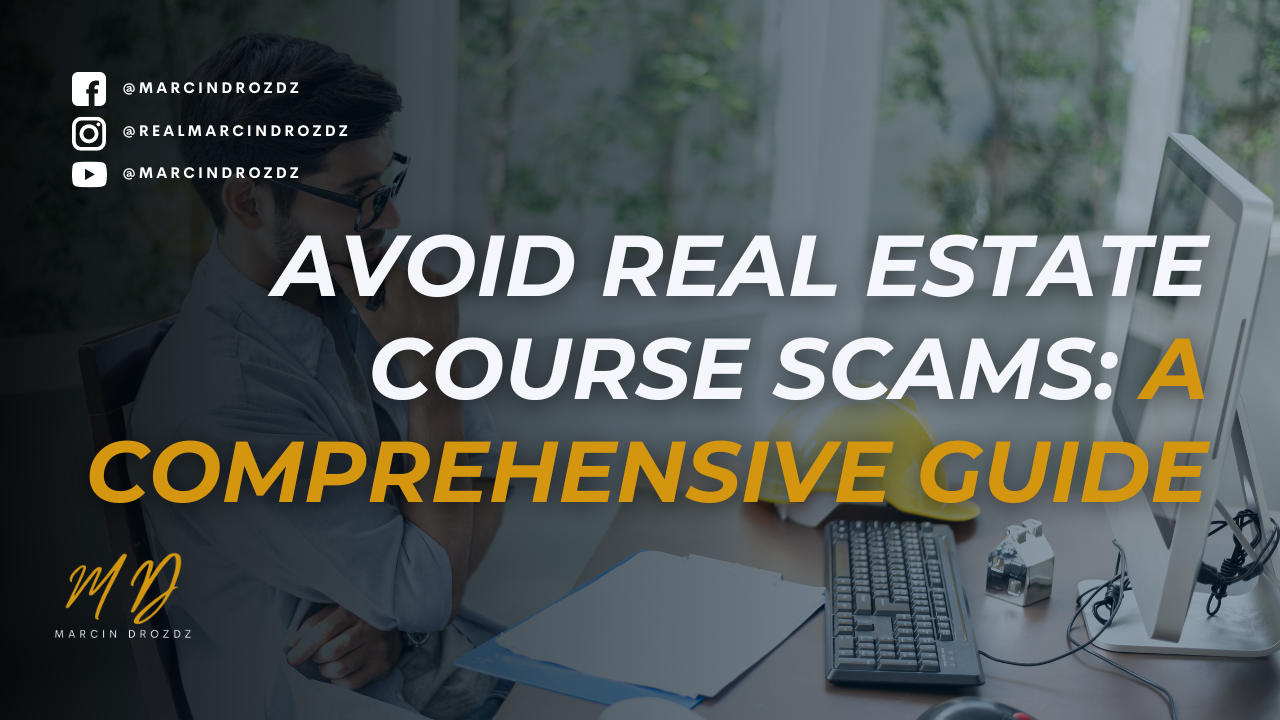Avoid Real Estate Course Scams: A Comprehensive Guide
Feb 17, 2025
Thinking about enrolling in a real estate course to level up your knowledge and skills? With the rise of online education, scams in the real estate training space are becoming more common—and falling for one can cost you both time and money.
The good news? There are excellent programs out there—you just need to know how to spot the real ones from the frauds.
Here are 7 things to look for to protect yourself from a real estate course scam.
1. Research and Verify Credentials
Before enrolling, do your due diligence on the course provider and instructor.
✅ Check their credentials – Are they a real estate expert with a proven track record?
✅ Read reviews and testimonials – What do past students say?
✅ Verify experience – Look for a solid background in real estate investing, not just coaching.
✅ Look for reputable affiliations – Are they connected to trusted organizations or professionals?
🚩 Red Flag: If the instructor has no real-world experience in real estate, but only makes money selling courses.
2. Watch Out for Unrealistic Promises
If a course promises:
🚫 "Guaranteed success in 30 days!"
🚫 "No money? No experience? No problem! You’ll be a millionaire overnight!"
🚫 "Follow this one simple trick, and you’ll be rich!"
…run the other way.
✅ Legitimate real estate education emphasizes:
Hard work
Dedication
Continuous learning
Realistic timelines
🔍 Action Step: Look for courses that outline the actual challenges of real estate investing, not just hype and easy wins.
3. Evaluate the Course Content and Curriculum
A good real estate course should cover critical topics like:
📌 Property Analysis – How to evaluate deals
📌 Market Trends – Understanding shifts and timing
📌 Financing Strategies – Loans, capital raising, and creative financing
📌 Legal Aspects – Contracts, taxes, and compliance
🚩 Red Flag: If the course is vague, overly generic, or lacks structure, it’s probably not worth your money.
🔍 Action Step: Request a syllabus or sample lesson to ensure real educational value.
4. Seek Recommendations from Industry Professionals
Your best bet? Ask people already in the game.
✅ Talk to experienced investors, agents, or brokers
✅ Ask for course referrals from those who have taken them
✅ Join online real estate communities (Facebook groups, BiggerPockets, LinkedIn forums)
🚩 Red Flag: If a course has no real presence in industry circles or no one reputable recommends it.
🔍 Action Step: Network before you invest in education.
5. Request Course Demos Before Committing
Legitimate educators want you to see what they offer before paying. Look for:
✔️ Free training sessions or sample modules
✔️ Live Q&A webinars where you can ask questions
✔️ Trial access to the learning platform
🚩 Red Flag: If the provider is pushing hard sales tactics with no way to preview the content.
🔍 Action Step: Always test before you buy.
6. Understand Refund Policies and Guarantees
A real course provider stands behind their product. Before signing up, check:
✅ Is there a money-back guarantee?
✅ Are refund terms clear and reasonable?
✅ Do students have recourse if they’re unsatisfied?
🚩 Red Flag: If the refund policy is vague, full of loopholes, or non-existent.
🔍 Action Step: Read the fine print before paying.

7. Trust Your Instincts and Exercise Caution: Trust your instincts. If something feels off or too good to be true, it probably is. Scammers employ high-pressure tactics and manipulative sales techniques. Take your time, ask questions, and evaluate the legitimacy of the course.
Follow me on:
- LinkedIn: @MarcinDrozdz
- YouTube: @MarcinDrozdz
- Instagram: @MarcinDrozdz
- Facebook: @MarcinDrozdz
The information contained herein is for general guidance on matters of interest only. This information contained herein is not intended to provide you with any advice on financial planning, investment, insurance, legal, accounting, tax or similar matters and should not be relied upon for such purposes. Marcin Drozdz, M1 Real Capital Inc are not financial, legal or tax advisers. You should assess whether you require such advisers and additional information and, where appropriate, seek independent professional advice. You understand this to be an expression of opinions and not professional advice. You are solely responsible for any actions you take with the content and hold Marcin Drozdz and M1 Real Capital Inc or any of it's affiliates harmless in any event or claim.





